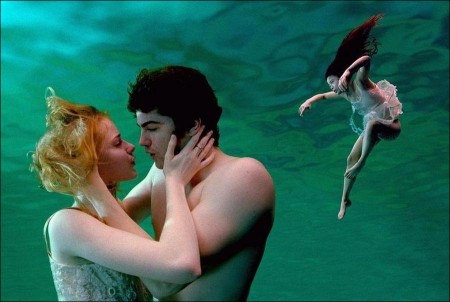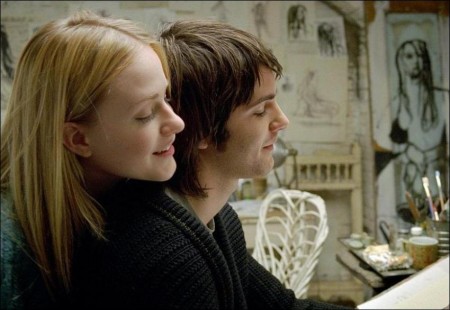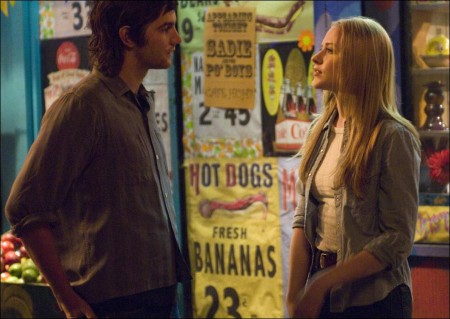Julie Taymor, the groundbreaking visionary behind Revolution Studios’ new film Across the Universe, says that she first conceived a film that would, in her words, “investigate the ‘60s. It had to penetrate all levels of the Beatles’ songs. From the love songs to the political songs, the music and the film would not just reflect the microcosm of a character’s experience, but, from my perspective, would also represent the macrocosm of the events that are happening in the world.”
For Taymor, though the film is set a generation back, making the story and the film fresh and alive for today’s audiences was the entire point. “I really want young people to see the passion in this movie – to see with what fervor these characters invested themselves into social movements as well as self-exploration,” she says. “I hope it really speaks ‘across the universe’ and across cultures… that anybody could identify with the situations and the events that are happening in this movie.”
According to producer Jennifer Todd, the film is an artistic statement from Taymor. “In addition to being a unique voice, Julie is the hardest-working director I’ve ever worked with,” she says. “It’s an amazingly satisfying experience to work with someone who lives and breathes the movie morning, noon, and night. One particular weekend, we went away and came back to discover that an entire new sequence had been invented. Because she’s like that, she attracts people who want to work just as hard to achieve her vision.”
Producer Matthew Gross, who generated the project, concurs. “Julie is a national treasure,” he says. “She is a true artist – not only does she bring visual appeal, but she has just the right touch with the singers and dancers, which was so necessary for this film. The work she did in Titus and Frida show her incredible vision. In addition, because everyone wants to work with Julie Taymor – and with good reason – she is able to attract top artists and amazing talent to work with her. She is a tremendous asset to the film in every way.”
Unlike most musicals, where a story comes first and songs are inserted in at key points, the songs created the story. “Beginning with over 200 songs written by the Beatles, we eventually chose 33 that we felt best told the story of a generation and a time,” says Taymor.
Todd explains, “The film is an original musical and it has an original story – one you’ve never seen before, inspired by Beatles’ music in a way that you haven’t heard before.” “The entire concept of this musical,” Taymor explains, “is that the lyrics will tell the story. They are the libretto, they are the arias, they are the emotion of the characters.” Although Taymor was only in her early teens in the 1960s, the story was inspired by her childhood observations:
“Lucy and Max, the brother and sister, are modeled slightly after my own older brother and sister, and I’m Julia, the young girl who’s watching. During that time, I was a voyeur to what my parents were going through with teenagers and then college students who were going through the radical political movement: the draft, the hippies, the drugs. And so I was there – I didn’t get immersed myself, but I watched it.”
Taymor admired the outspoken spirit of the time. “People really took chances,” she says. “As Lucy says, ‘I’d lie down in front of a tank if it would bring my brother home from the war.’ And of course Jude responds, ‘But it wouldn’t,’ and she gets upset and she says, ‘Does that mean you don’t think I should try?’ I’m so moved by the fact that at that time, people would try.”
But Taymor definitely did not view the project as a piece of nostalgia. She notes that many of the issues facing young people in the ‘60s are still very relevant today. The filmmakers’ goal was to translate the passion and feeling of the 60s and have it resonate in a way that made it feel as contemporary as possible. The reason to make a film like this, in her mind, was the immediacy of the themes. “You constantly have to revisit these stories in order to reflect upon your present and really think, ‘What is it that’s different now?’” Taymor says. “That era is explicitly important to our time now.”
In order to bring the era to life, Taymor and screenwriters Dick Clement & Ian La Frenais created an entirely new story, using the songs to guide their way. “Characters were created for the songs,” Taymor continues. “For example, the character Prudence: I loved the idea of taking ‘I Want to Hold Your Hand’ and giving it to an innocent cheerleader in Ohio.”
The song begins with the young girl singing plaintively on the sidelines of the football field. “We don’t change the lyrics,” says Taymor, “but partway through, you realize she’s not in love with the quarterback – she’s in love with the blonde cheerleader. All of the sudden the song works in a totally different way, because it’s about repressed love. By the end of the song, this young girl, who doesn’t even know what she’s feeling, leaves home. She hitchhikes her way to New York City. Without having to go into the background of the character, without having to see her mother and her father and her life story, the song says it all.”
“As we went through the journeys of characters, songs came up,” Taymor continues. “In the story, Max is going to be drafted into the Army. I went through dozens of songs until finally I got to ‘I Want You’ and it registered in my head, ‘My God, “I Want You,” isn’t that the Uncle Sam motto?’” It was a perfect fit.
In still other cases, like “Revolution,” the directness of the lyrics led them to portray the emotion of a scene in a stronger way than dialogue could. “When Jude sings ‘Revolution,’ he’s actually breaking into the Students For Democratic Reform office, going right up to Lucy, and using the emotion of the music and those lyrics to express himself instead of saying it just with straight dialogue,” notes Taymor. “He keeps singing because he’s in a state of being that is beyond the everyday; he’s in a heightened state that’s going to get him beat up and thrown out by the end of the song. It really helps us encapsulate time, because the music helps you to go very quickly through an emotional state and get to another level that is very, very heightened and very dramatic.”
Related Link: View the Full Production Notes for Across the Universe
Views: 257





